It’s no secret a majority of farmers are having a tough couple of years. Rising costs of farming coupled with low commodity and milk prices, tariffs, weather, etc. have put a number of farms in turmoil.
There are a lot of farmers who will make it through though. Sometimes trying a different market, diversification, good business sense, farm management, or a combination of those will ensure they pull through just fine. I know we will, and many of our friends and neighbors will, too.
One of these neighbors is my friend Matt Henkes of Henkeseen Holsteins. Matt milks 60 cows on his family’s dairy farm, which is pretty small by today’s U.S. dairy standards.
There have long been media rumors out there that big corporations are putting small farms out of business. Perhaps you’ve gotta “go big or go home” to make it. Farmers can’t afford proper care, equipment, or can’t get by without subsidies. These are topics that are surrounded by myths or very complicated at the least, where we can’t paint everyone’s scenario with the same brush.
Matt’s milk goes to Prairie Farms, which bought out Swiss Valley. There’s a pretty big milk plant in our area that has been good for our local economy with a lot of jobs. Matt says he feels good about the merger.
“We’ve been pretty happy,” Matt says. “I think they’re a pretty good company.”
Compared with some other companies, they offer a higher price to dairy farmers. The biggest concern with these companies is that perhaps they’d stop picking up at all these smaller farms. If the trucks only need to stop at one big farm as opposed to a bunch of little farms, sometimes this makes more business sense for the corporations, but at this current time, we don’t see that happening. Which is really nice. I hope they keep it that way and continue to support small, local dairies, and numerous families.
Dairy farmers care greatly about how they raise their livestock and always strive to improve production and comfort. “Cow comfort is key in the dairy industry. Comfy cows make for happy healthy cows. This is something we take great pride in at Henkeseen Holsteins,” Matt says. “By providing a very comfortable environment for the cows in return they produce more milk and have fewer health problems.”
He sent me photos of the new mats they got on their farm to improve cow comfort. And yes, I tested them out. I just wanted to snuggle up and nap with my favorite cow, Demi! Cows spend 14 hours a day lying down, so it’s very important they have a good “mattress.”
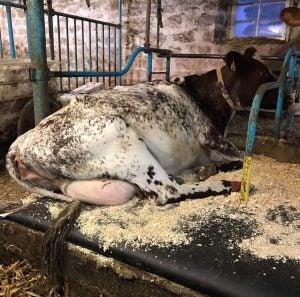
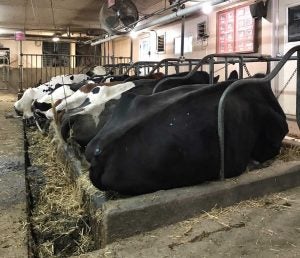
Each mat costs around $300, so this can be an expense that really adds up for a small farm. Matt did explain the ROI (return on investment) though, that these mats improve comfort and last about 15 years or so, and it was time. Many of them were due for replacement.
First they lay the mattress in each stall. They are filled with recycled tires.
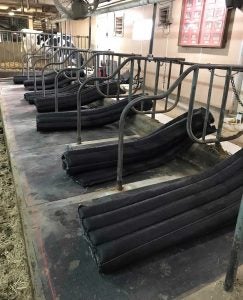
Next they put a 2-inch pad down for more cushion.
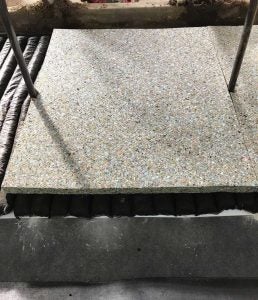
They then put a protective cover and straw on top.
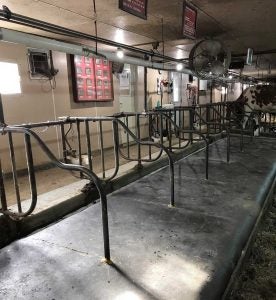
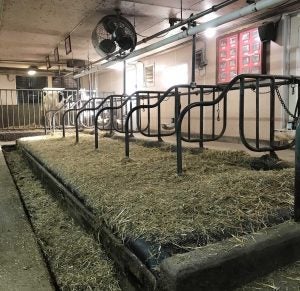
Matt has a master’s degree in dairy science from Iowa State. In addition to milking cows, his farm does some crop farming, raises and sells bulls, and sells breeding stock on the female side. Every little bit helps. But during the winter months here in Iowa, we can get a lot of snow and ice, and farmers don’t want them to slip and fall in the cold, brutal weather. Therefore, the cows at Henkeseen Holsteins during the winter are raised indoors in a climate-controlled barn, where their environment doesn’t change much.
This is yet another reason for proper cow comfort. When they’re comfortable, it is visually easier to see if they’re in heat. They’ll move around a bit more. Perhaps they’ll beller a little more, or try and ride the cow in the next stall. Cows come into heat every 21 days, so if a farmer can catch them in estrus (heat) easier, it makes for easier breeding, better pregnancy rate, and overall higher quality milk production.
Once a month the milk tester comes out to their farm and tests how much milk the cows are producing, and Matt is looking forward to seeing if the milk production goes up with improved comfort and by how much. Also, when cows aren’t comfortable, their hocks can get abrasions, they can get swollen or puffy, they may need to have the vet out more often. Healthy, happy cows means less vet bills, less medicine, better for the dairy farm’s bottom line. Despite hard times on many farms, it’s so important to understand that animal care always takes a top priority.
Michelle Miller, the Farm Babe, is an Iowa-based farmer, public speaker, and writer, who lives and works with her boyfriend on their farm, which consists of row crops, beef cattle, and sheep. She believes education is key in bridging the gap between farmers and consumers.



